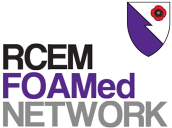
Audio clip: Adobe Flash Player (version 9 or above) is required to play this audio clip. Download the latest version here. You also need to have JavaScript enabled in your browser.
[Direct Download Podcast MP3]
A one off special based upon careers in Emergency Medicine and a new training tool, the ESLE.
We’ll be running through the following;
- Start – A day in the life of an EM trainee – Jonathan Argall & Duncan Carmichael
- 10:03 – Training – Chris Arrowsmith & Duncan Carmichael
- 17:45 – EM careers – dual training with ICM – Mike Patterson & Duncan Carmichael
- 28:18 – The ESLE – Lynsey Flowerdew
A day in the life of an EM trainee
Emergency Medicine is a varied, fun and extremely rewarding specialty. This podcast describes a day in the life of an EM trainee, detailing the highlights and some of the challenges encountered along the way. It describes some of the unique opportunities that EM training provides, such as involvement in expedition and event medicine. It concludes with some advice about next steps for those that are interested in a career in EM.
Training
Training in Emergency Medicine is designed to equip doctors with the knowledge and skills to see the breadth of illness and injury in all age groups. It is also focused on developing shop-floor leadership and management skills. In this podcast we hear from an Emergency Department Consultant and Training Program Director about the different stages of training along with the requirements for successful progression. There is also some useful advice about where to access further help and information.
EM careers – dual training with ICM
Emergency Medicine with Intensive Care Medicine sub-specialty training is a recognised dual-accreditation, successful completion of which allows doctors to work in both EM and ICM. In this podcast we hear from an ED/ICM dual trained Consultant, explaining why to choose this career path and what the work involves. There is also some useful advice if you are considering this as a training option, as well as details of where to find out more information.
The ESLE
The main focus of workplace-based assessment in Higher Specialty Training (ST4-6) is the development of higher level, non-technical skills. Non-technical skills are defined as, “the cognitive, social and personal resource skills that complement technical skills and contribute to safe and efficient task performance”. Examples of NTS include communication, decision-making, leadership and workload management. To facilitate feedback relating to non-technical skills, a novel specialty-specific tool, the ELSE (Extended Supervised Learning Event), has been developed. This podcast has been developed to introduce the ELSE and give a description of the main non-technical skills included in the tool.
A copy of the tool can be found here ESLE Assessment tool v2.
References for ESLE
Flowerdew L, Gaunt A, Spedding J, Bhargava A, Brown R, Vincent C, Woloshynowych M. A multicentre observational study to evaluate a new tool to assess emergency physicians’ non-technical skills. Emerg Med J. 2012.
Flowerdew L, Brown R, Vincent C, Woloshynowych M. Development and validation of a tool to assess emergency physicians’ nontechnical skills. Ann Emerg Med. 2012.
Flowerdew L, Brown R, Vincent C, Woloshynowych M. Identifying nontechnical skills associated with safety in the emergency department: a scoping review of the literature. Ann Emerg Med. 2012
Flowerdew L, Brown R, Russ S, Vincent C, Woloshynowych M. Teams under Pressure in the Emergency Department: An interview study. Emerg Med J.
